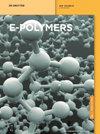Design, synthesis, characterization, and adsorption capacities of novel superabsorbent polymers derived from poly (potato starch xanthate-graft-acrylamide)
IF 3.3
3区 化学
Q2 POLYMER SCIENCE
引用次数: 0
Abstract
Novel superabsorbent polymers (SAPs) were synthesized by performing aqueous solution graft copolymerization of potato starch xanthate and partially hydrolyzed acrylamide using由聚(马铃薯淀粉黄原酸盐-接枝-丙烯酰胺)衍生的新型超吸附聚合物的设计、合成、表征和吸附能力
以 N,N′-亚甲基双丙烯酰胺为交联剂,过硫酸钾为氧化剂,在 35-45°C 温度条件下,通过水溶液接枝共聚马铃薯淀粉黄原酸盐和部分水解丙烯酰胺,合成了新型超吸水性聚合物(SAP)。详细研究了影响 SAP 吸水性的各种因素,并通过正交实验确定了最佳配方比例。为了确定 SAP 的结构,使用了多种光谱技术,包括扫描电子显微镜、傅立叶变换红外光谱、热重分析和透射电子显微镜。此外,还进行了各种重金属离子的吸附实验,包括二价铜离子、锌离子、镍离子、钴离子、镉离子和铅离子。实验表明,制备的 SAP 具有很高的吸附性能(48 mg-g-1)。因此,这些材料有望在去除重金属离子和分离水生环境中的染料方面得到重要应用。
本文章由计算机程序翻译,如有差异,请以英文原文为准。
求助全文
约1分钟内获得全文
求助全文
来源期刊

e-Polymers
化学-高分子科学
CiteScore
5.90
自引率
10.80%
发文量
64
审稿时长
6.4 months
期刊介绍:
e-Polymers is a strictly peer-reviewed scientific journal. The aim of e-Polymers is to publish pure and applied polymer-science-related original research articles, reviews, and feature articles. It includes synthetic methodologies, characterization, and processing techniques for polymer materials. Reports on interdisciplinary polymer science and on applications of polymers in all areas are welcome.
The present Editors-in-Chief would like to thank the authors, the reviewers, the editorial staff, the advisory board, and the supporting organization that made e-Polymers a successful and sustainable scientific journal of the polymer community. The Editors of e-Polymers feel very much engaged to provide best publishing services at the highest possible level.
文献相关原料
公司名称
产品信息
阿拉丁
Carbon disulfide
阿拉丁
Potato starch
 求助内容:
求助内容: 应助结果提醒方式:
应助结果提醒方式:


